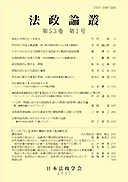Volume 27
Displaying 1-20 of 20 articles from this issue
- |<
- <
- 1
- >
- >|
-
Article type: Cover
1991 Volume 27 Pages Cover1-
Published: May 15, 1991
Released on J-STAGE: November 01, 2017
Download PDF (34K) -
Article type: Cover
1991 Volume 27 Pages Cover2-
Published: May 15, 1991
Released on J-STAGE: November 01, 2017
Download PDF (34K) -
Article type: Appendix
1991 Volume 27 Pages App1-
Published: May 15, 1991
Released on J-STAGE: November 01, 2017
Download PDF (73K) -
Article type: Article
1991 Volume 27 Pages 1-2
Published: May 15, 1991
Released on J-STAGE: November 01, 2017
Download PDF (122K) -
Article type: Article
1991 Volume 27 Pages 3-14
Published: May 15, 1991
Released on J-STAGE: November 01, 2017
Download PDF (848K) -
Article type: Article
1991 Volume 27 Pages 15-22
Published: May 15, 1991
Released on J-STAGE: November 01, 2017
Download PDF (559K) -
Article type: Article
1991 Volume 27 Pages 23-31
Published: May 15, 1991
Released on J-STAGE: November 01, 2017
Download PDF (692K) -
Article type: Article
1991 Volume 27 Pages 32-40
Published: May 15, 1991
Released on J-STAGE: November 01, 2017
Download PDF (685K) -
Article type: Article
1991 Volume 27 Pages 41-52
Published: May 15, 1991
Released on J-STAGE: November 01, 2017
Download PDF (855K) -
Article type: Article
1991 Volume 27 Pages 53-62
Published: May 15, 1991
Released on J-STAGE: November 01, 2017
Download PDF (750K) -
Article type: Article
1991 Volume 27 Pages 63-71
Published: May 15, 1991
Released on J-STAGE: November 01, 2017
Download PDF (670K) -
Article type: Article
1991 Volume 27 Pages 72-89
Published: May 15, 1991
Released on J-STAGE: November 01, 2017
Download PDF (1064K) -
Article type: Article
1991 Volume 27 Pages 90-99
Published: May 15, 1991
Released on J-STAGE: November 01, 2017
Download PDF (712K) -
Article type: Article
1991 Volume 27 Pages 100-113
Published: May 15, 1991
Released on J-STAGE: November 01, 2017
Download PDF (986K) -
Article type: Appendix
1991 Volume 27 Pages A23-A25
Published: May 15, 1991
Released on J-STAGE: November 01, 2017
Download PDF (111K) -
Article type: Appendix
1991 Volume 27 Pages A22-A15
Published: May 15, 1991
Released on J-STAGE: November 01, 2017
Download PDF (723K) -
Article type: Bibliography
1991 Volume 27 Pages A14-A1
Published: May 15, 1991
Released on J-STAGE: November 01, 2017
Download PDF (360K) -
Article type: Appendix
1991 Volume 27 Pages App2-
Published: May 15, 1991
Released on J-STAGE: November 01, 2017
Download PDF (29K) -
Article type: Cover
1991 Volume 27 Pages Cover3-
Published: May 15, 1991
Released on J-STAGE: November 01, 2017
Download PDF (48K) -
Article type: Cover
1991 Volume 27 Pages Cover4-
Published: May 15, 1991
Released on J-STAGE: November 01, 2017
Download PDF (48K)
- |<
- <
- 1
- >
- >|
